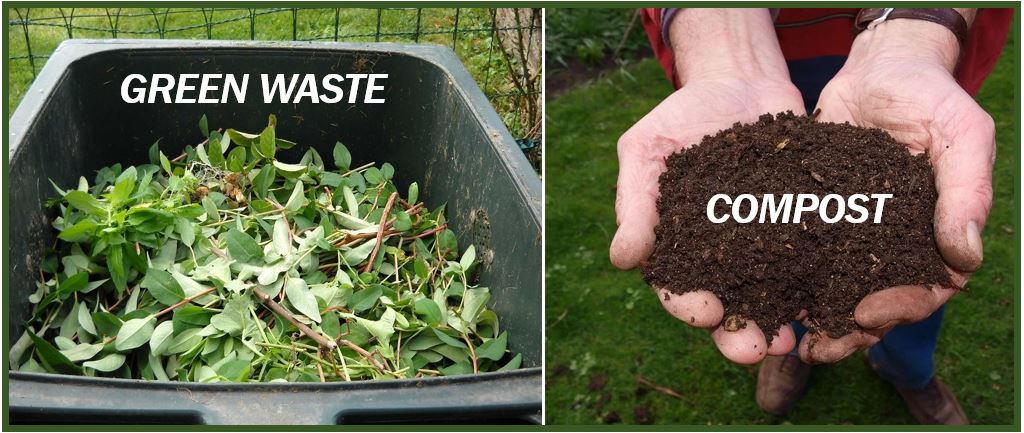Green waste, garden waste, or biological waste is organic waste that can be composted. It makes up approximately 14% of the average household bin. It is most usually made of grass clippings, leaves, tree trunks, weeds, old plants, and domestic (kitchen) waste. Organic, in this context, refers to anything that used to live. The interesting thing about this kind of waste is that you can recycle it on your own and, therefore, help protect the environment.
 This is what happens with all that green waste once it has been collected:
This is what happens with all that green waste once it has been collected:
Let’s say that you have decided to clean up your backyard. Spring is just around the corner and it is the prime time for you to start thinking about all the overgrowth that has accumulated since last year.
You will probably start by picking up all the debris that makes it difficult or impossible for people to walk through. First, you need to take care of all the overgrown plants in your garden and then collect all the garbage. An overgrown garden is an unsightly place. It can also be very hard to keep clean.
Use shears or secateurs and strip away all the loose or dead branches and trim back overgrown trees, shrubs, hedges, etc. Then collect all the dead leaves, twigs, and other ‘green’ waste from the lawn, patio, or deck area. If you don’t have enough spare time on your hands to do all that, you can contact a company that can do that for you. Like most people, at certain times of year you will decide that it is time to make your garden look nice again.
Once you have all the green waste in the bin(s), its final destination is up to you. You can either let refuse collectors take it or make your own compost. Refuse trucks will take the organic matter that you threw away to a special composting site or a waste processing facility.
Once it gets there, it first undergoes a selection process, i.e., things get sorted into categories. Everything that is not compostable is removed, while the remaining waste goes into a giant shredder. The shreded material is then laid out in long piles known as windrows to decompose.
When organic matter undergoes a process we call composting, we eventually get compost. Compost is very rich in nutrients which help trees, shrubs, grass, and other plants thrive. Most of us think that compost consist of only decomposed plant matter, but it also includes animal matter.
Temperatures of up to 60°C
These sites work similarly to your home compost bin, but there is a small difference – they are way faster. Because of the huge volumes, temperatures reach up to 60°C, which means that they turn into compost much faster than anywhere else.
People responsible for this process frequently have to turn the windrows so that the organisms that decompose everything get enough oxygen to continue doing their job. These high temperatures also help kill off undesirable diseases and microorganisms.
They Leave Nothing to Chance
Before the organic matter can be used, it is once again screened to remove contaminants and items that should not be there. If workers find pieces that are too large, they put them back so that they go through the same process again. Decomposition typically takes between 8 and 16 weeks.
Put the Compost to Good Use
The final product is a dark-coloured compost that easily crumbles. You can add it to the soil at any time of year. It is free of contaminants and other nasty things gardeners don’t want. The benefits are numerous. Compost helps the soil have the right levels of nutrients, water, air, and reduces the need for chemical fertilizers. It also boosts the production of fungi and bacteria that break down organic matter to create a nutrient-rich material called humus.
Compost also protects our garden plants from diseases such as:
- Wilt caused by Fusarium (species).
- Damping-off caused by Fusarium, Pythium, Rhizoctonia and Scletorium spp.
- Stem and root rot caused by Fusarium, Rhizoctonia, Pythium, Sclerotium, and Aphanomyces species.
____________________________________________________
Interesting related matter: “How gardening can improve your overall health.”

